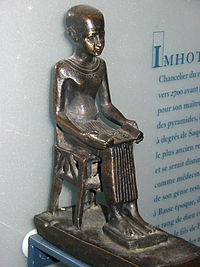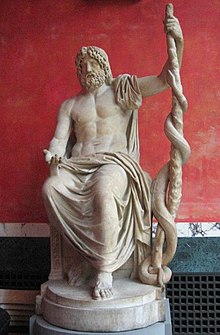|
The Greek physician Hippocrates, considered the "father of medicine", laid the foundation for a rational approach to medicine. Hippocrates introduced the Hippocratic Oath for physicians, which is still relevant and in use today, and was the first to categorize illnesses as acute, chronic, endemic and epidemic, and use terms such as, "exacerbation, relapse, resolution, crisis, paroxysm, peak, and convalescence". 
The Greek physician Hippocrates (ca. 460 BCE – ca. 370 BCE), considered the father of Western medicine. The Greek physician Galen was also one of the greatest surgeons of the ancient world and performed many audacious operations, including brain and eye surgeries. After the fall of the Western Roman Empire and the onset of the Early Middle Ages, the Greek tradition of medicine went into decline in Western Europe, although it continued uninterrupted in the Eastern Roman (Byzantine) Empire. Prehistoric medicine incorporated plants (herbalism), animal parts and minerals. In many cases these materials were used ritually as magical substances by priests, shamans, or medicine men. Well-known spiritual systems include animism (the notion of inanimate objects having spirits), spiritualism (an appeal to gods or communion with ancestor spirits); shamanism (the vesting of an individual with mystic powers); and divination (magically obtaining the truth). The field of medical anthropology examines the ways in which culture and society are organized around or impacted by issues of health, health care and related issues. 
Statuette of ancient Egyptian physician Imhotep, the first physician from antiquity known by name. 
An ancient Greek patient gets medical treatment: this aryballos (circa 480-470 BCE, now in Paris’s Louvre Museum) probably contained healing oil Early records on medicine have been discovered from ancient Egyptian medicine, Babylonian medicine, Ayurvedic medicine (in the Indian subcontinent), classical Chinese medicine (predecessor to the modern traditional Chinese Medicine), and ancient Greek medicine and Roman medicine. The Egyptian Imhotep (3rd millennium BC) is the first physician in history known by name. Earliest records of dedicated hospitals come from Mihintale in Sri Lanka where evidence of dedicated medicinal treatment facilities for patients are found. The Indian surgeon Sushruta described numerous surgical operations, including the earliest forms of plastic surgery. The pharmaceutical industry develops, produces, and markets drugs licensed for use as medications. Pharmaceutical companies can deal in generic and/or brand medications. They are subject to a variety of laws and regulations regarding the patenting, testing and marketing of drugs. Contemporary medicine applies health science, biomedical research, and medical technology to diagnose and treat injury and disease, typically through medication, surgery, or some other form of therapy. The word medicine is derived from the Latin ars medicina, meaning the art of healing. 
Statue of Asclepius, the Greek God of medicine, holding the symbolic Rod of Asclepius with its coiled serpent 
Modern drug ampoules 
The Doctor, by Sir Luke Fildes (1891) Orthopedic surgery or orthopedics (also spelled orthopaedics) is the branch of surgery concerned with conditions involving the musculoskeletal system. Orthopedic surgeons use both surgical and nonsurgical means to treat musculoskeletal trauma, sports injuries, degenerative diseases, infections, tumors, and congenital disorders. Nicholas Andry coined the word "orthopaedics", derived from Greek words for orthos ("correct", "straight") and paideion ("child"), when he published Orthopaedia: or the Art of Correcting and Preventing Deformities in Children in 1741. In the United States orthopedics is standard, although the majority of university and residency programs, and even the American Academy of Orthopaedic Surgeons, still use Andry’s spelling. Elsewhere, usage is not uniform; in Canada, both spellings are acceptable; orthopaedics usually prevails in the rest of the Commonwealth, especially in Britain 
This fracture of the lower cervical vertebrae, known as a "teardrop fracture", is one of the conditions treated by orthopedic surgeons and neurosurgeons. 
This image, taken in September 2006, shows extensive repair work to the right acetabulum 6 years after it was carried out (2000). Further damage to the joint is visible due to the onset of arthritis. 
Orthopedic implants to repair fractures to the radius and ulna. Note the visible break in the ulna. (right forearm)
From Wikipedia, the free encyclopedia : Wholesale trade in pharmaceutical products, medical instruments and orthopedic |


